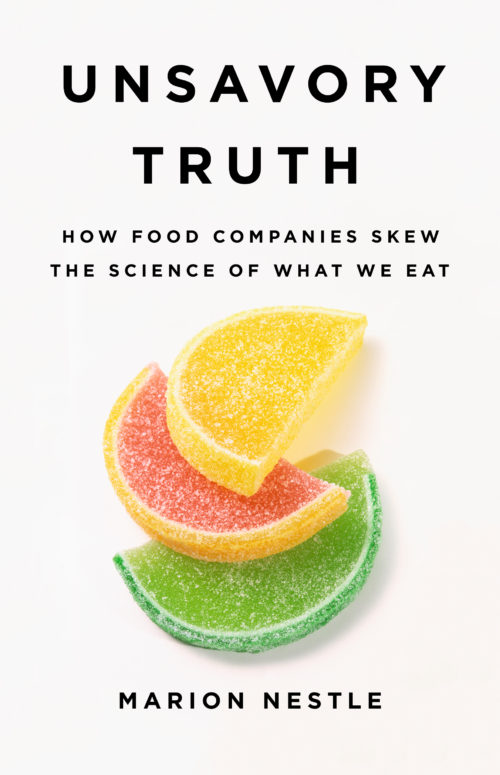Join Health Affairs for a virtual conversation between me and Angela Odoms-Young of Cornell University discussing the evolution of US food and nutrition policy, the current policy landscape, and thoughts on what lies ahead. It’s at 1:00 p.m. EDT. To join the Webinar, click here.
Unsavory Truth: Early reviews
Coming October 30: My new book about food company sponsorship of nutrition research and its effects on public health.
The Kirkus review (August 1)
A leading nutritionist asks whether consumers can trust highly publicized research into whether food and beverages are healthy and safely produced.
Nestle (Emerita, Nutrition, Food Studies, and Public Health/New York Univ.; Big Soda Politics: Taking on Big Soda (and Winning), 2015, etc.), who has a doctorate in molecular biology and a master’s degree in public health nutrition and has conducted decades of research into food producers, is perfectly positioned for this topic. She makes the convincing case that because so much of the research is paid for by industries that benefit from the results, buyers should interpret the results skeptically. Many of Nestle’s previous books, articles, and academic studies focused on specific types of food. Here, the author turns her attention to large corporations, investigating why they pay for supposedly independent researchers, why the quality of the research might be compromised by conflicts of interests, how consumers can separate reliable science from compromised science, and why consumers should lobby legislators, government regulatory agencies, and universities for reforms regarding the disclosure of conflicts. Nestle emphasizes research paid for and disseminated by the sugar/candy industry, producers of dairy foods, marketers of meat, and—in its own chapter, “A Case Study in Itself”—the soda giant Coca-Cola. Since the author is a prolific nutrition researcher who has accepted funding that could involve conflicts of interest, she admirably scrutinizes her own policies of funding and how she discloses it. Ultimately, researchers must act as ethicists as well as scientists. When her own studies and those of fellow researchers become marketing tools for multinational conglomerates, the author admits that she feels queasy about how consumers might be misled by the marketing. On the other hand, she writes, some studies paid for by industry can be trusted scientifically—and be marketed and advertised responsibly.
Nestle proves yet again that she is a unique, valuable voice for engaged food consumers.
Other early reviews & interviews based on the bound galley proofs
Sept 25 La Stampa (Italy): “I cibi di lunga vita sono illusori e troppi sponsor li promuovono.”
Sept 24 Publishers Weekly: ” a groundbreaking look at how food corporations influence nutrition research and public
policy.”
Aug 13 Booklist review: “This well-documented, accessible venture makes a compelling argument.”
Aug 1 Kirkus review: “Nestle proves yet again that she is a unique, valuable voice for engaged food consumers.”
July 17 Phil Lempert’s Lempert Report: Get ready for a new era of transparency (video)
July 9 David Wineberg, “Nutrition: conflict of interest as a career,” Medium.com.
Feb 12 Finnish Public Radio interview about Unsavory Truth (Google Translate, English)
Jan 31 Profile in New Scientist: The Unpalatable Truth about Your Favorite foods

